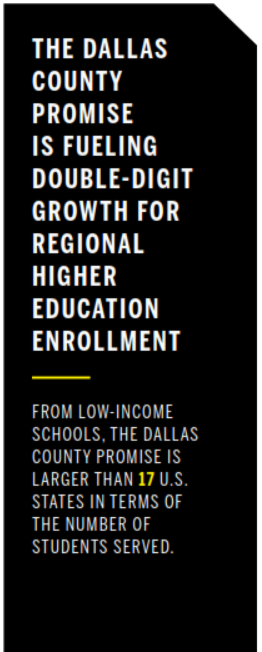Leveraging a new $535M campus, a “promise” and blockchain to prep a new generation for the workforce
With thousands of jobs moving to the DFW Region and being created each day, the hunt for top talent is ever-growing. Companies need good talent — and they need it fast.
In Dallas County, tech and community college thought leaders are approaching the problem in design-thinking fashion: understanding the problem, empathizing with those involved and not being afraid to pull the trigger on unconventional solutions.
‘Promise’ of Free Higher Education
Nearly 2,000 high school students attending one of nearly 60 high schools in Dallas County have joined the Dallas County Promise program, which guarantees free tuition at any Dallas College campus and additional scholarships for free tuition at participating four-year institutions, which include UNT Dallas, SMU, Texas A&M – Commerce, Texas Woman’s University and Austin College.

“The point of Promise is to let these young students know they have options when it comes to attending a university,” says Laura Flores, an academic coach at Dallas College. “When you tell a student that, yes, college is for them, it not only impacts the student’s life, it changes the lives of their parents and the community in a
very positive way.”
Promise is funded by federal financial aid dollars and the Dallas College Foundation, effectively removing financial barriers that keep Dallas County students from attending college. The program was launched in 2017 and has expanded to 57 high schools across 11 public school districts and will eventually encompass all high schools in Dallas County.
A New Kind of Downtown Campus
Perhaps the largest single demonstration of support for upskilling Dallas County’s workforce in recent memory occurred during the May 2019 election. In that election, nearly three-fourths of all votes cast in Dallas County approved the sale of a $1.1 billion bond, about half of which will build a state-of-the-art education and innovation hub in Downtown Dallas.
The hub is a brainchild resulting from DFW bids for corporate HQs, creating a campus that includes community colleges, four-year universities and industry all utilizing the space as a cohesive workforce pipeline. “Not every HQ happens,” Dallas College Chancellor Dr. Joe May said in an article in D Magazine, “but we still believe very strongly that what we need is an active, robust spectrum of learning opportunities.”
May says that the college district is growing fast enough to justify the new space. From fall 2013 to fall 2018, enrollment grew by 13 percent, from 73,206 students to 82,800. The district projects 92,000 students by 2030. The growth, May says, comes in large part from increased partnerships with regional school districts, many of which now allow students to earn Dallas College credit while still in high school. The district also works with local employers to create and grow targeted programs to the area’s labor-market needs.
“We’re looking at the building creating a flexible environment that we can adapt as we need to make changes in the programs to best fit the needs here,” says May.
Connecting the Dots for Credentials, Higher Education and Employers

The GreenLight Academic Credentials initiative is quickly gaining traction, according to its founder, Manoj Kutty.
“More than 10,000 students and alumni from Dallas College have already taken ownership of their credentials and started sharing them with academic institutions across the country,” he says, adding that more than 200 educational institutions nationwide are using GreenLight.
So far, Kutty’s team has migrated 1.7 million user records to GreenLight. More than 10,000 students have given GreenLight permission to release their transcripts.
Here’s how it works: First, students must give consent to having their academic records incorporated into the GreenLight database; the platform then acts like a sort of LinkedIn but with credentials that have been verified by established institutions (goodbye, padded resumes).
Kutty and GreenLight Chief Product Officer Shikant Jannu foresee the day when the platform is adopted by institutions of higher education nationwide. GreenLight is a particularly powerful tool for employers that are seeking people who have learned niche skills under specific instructors or programs; it’s also an effective recruiting tool for universities that are seeking applicants by particular academic category or credential. And a growing number of Dallas County high school students are increasing their credentials through Dallas County Promise.
This article is part of the 2020 Higher Education Review Magazine.